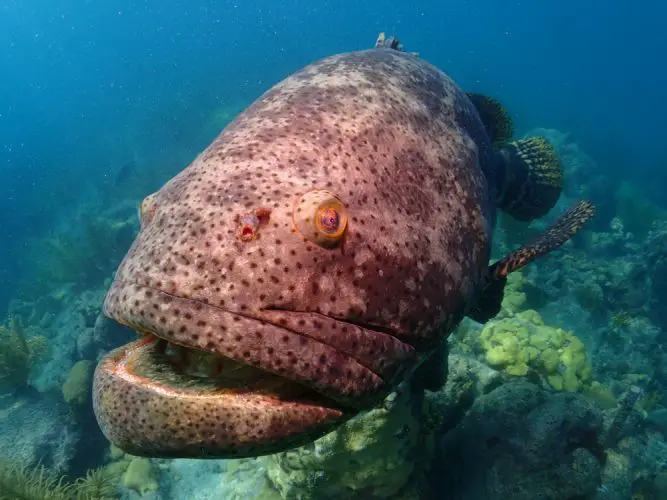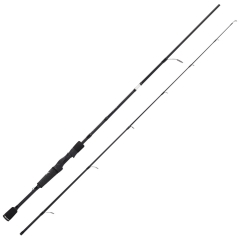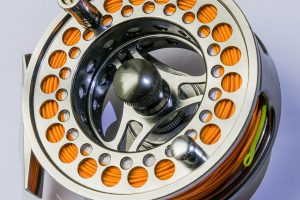Most groupers are born female and can change their sex to male as time passes, which is fascinating about this fish. So yes, most groupers are born female, but not all of them.
Groupers are a group of fish that include Epinephelus, Mycteroperca, Anyperidon, Cromileptes, Dermatolepis, Graciela, Saloptia, and Triso. There are more genera of fish that are considered to be groupers as well; therefore, they make up a large percentage of the fish in the ocean.
If you want to learn more about the sex change mechanism that most groupers have, then keep reading this article.
Do Groupers Change Their Sex?
Yes, groupers are a unique species of fish known as protogynous hermaphrodites that can change their sex. Sex change is a complicated issue, and only some species reach this stage. The change occurs when the fish reaches maturity, which varies from species to species.
How Does This Change Occur?
The main reason groupers can change their sex is that they have both reproductive organs, ovaries, and testes. The ovaries start developing during the embryo stage, which is why they are born female, but with time, some fish can choose to grow testes, turning them into male fish.
This depends on the age of the fish, the size of the fish, and the social control that it has. These three points are explained below so you understand how they contribute to sex change.
The Age of the Fish
Sex change can only happen when the fish reaches a certain age of maturity. Usually, it is when the fish becomes nine years old. The period when the fish mature depends on their lifespan and other factors, so it varies from species to species. The sex change occurs for reproductive reasons, so it only happens when reproduction is needed.
The Size of the Fish
The size of the fish is one of the main factors that determine if the fish will remain female or male. Larger fish usually change their sex to a male to control the harem better. Also, this strategy helps groupers by eliminating smaller groupers from reproducing so that their offspring are more vigorous. In this case, the small fish usually remains as the female fish.
The Social Control of the Fish
Of course, reproduction is a huge reason behind the sex change of this fish, but so is social control. Many fish form aggregations in their breeding area that can contain thousands of fish. The fish that controls this harem usually turns into a male fish and be highly territorial.
Why Do Groupers Change Sex?
Like humans, they adapt to the environment to survive, and so do groupers. The groupers found the best way to stay was by changing their sex. Of course, it depends on the location and the fish species because not all groupers can change their sex. There are two main reasons why a grouper transforms sex.
Reducing the Chance of Reproduction Failure
Many groupers live for a very long time; some groupers, like the giant grouper, have a lifespan of around 100 years. Other species don’t live for this long but have a long lifespan, so they take longer to mature. Sometimes a female fish might take 10 years to develop, so it will take 10 years to turn into a male fish.
This helps to maintain the age difference in a population and prevent inbreeding, which can cause the offspring to die. This increases the survival of the whole group of groupers. Moreover, if the male leader of the group dies, the oldest female fish can turn into a male fish within a few days so that the sex ratio of the group is maintained.
Increasing the Rate of Reproduction
Since an older female turns into a male fish, each fish can produce as many eggs as possible, increasing the number of eggs laid significantly. Sometimes the female fish all lay eggs together, so one male can fertilize them all. This allows there to be more female fish on the whole to lay eggs.
Most of the time, the female fish is caught by fishermen or dies before it can turn into a male fish. This means that there are more female fish and fewer male fish so that fewer fish can reproduce. Therefore, these fish are trying to keep their population alive by adapting to such reproduction methods.
How many days do groupers need to change sex?
Most fish have male or female reproductive organs. Groupers may “change sex.” Testes and ovaries are present. Embryos develop ovaries, so they’re born female. Female fish reach reproductive maturity. Testes develop after depositing eggs, and the fish turns male.
The process of “changing the sexes” may increase genetic variation, which can be an effective survival strategy. Most groupers reach sexual maturity after a period, except for the giant grouper, which may live for more than a hundred years. That is, the transition from female to male takes place after a period of ten years. By doing so, an age gap is maintained between the males and females that are part of the same population. This decreases the likelihood that reproductive failure will occur due to inbreeding and increases the likelihood that the whole population will continue to exist.
Surprisingly, suppose a male member of a population passes away. In that case, an older female member of the group may quickly transform into a male to maintain the same proportion of males to females within the group and improve the chances of successful reproduction.
Conclusion
Some creatures are hermaphrodites, meaning they have both male and female reproductive systems. They include groupers who can change their sex to boost the population’s survival rate. Now you know that most groupers can change sex, and some have both reproductive organs. This is done to conserve their population so they can keep reproducing. Groupers are very interesting fish that have very interesting behaviors.













Pingback: What are Red Grouper? | Reel Fishing Guru
Pingback: What Are Scamp Groupers? | Reel Fishing Guru
Pingback: Warsaw Grouper: What are They and More | Reel Fishing Guru
Pingback: What is the Difference between Grouper and Flounder? | Reel Fishing Guru
Pingback: What Is a Brown Spotted Grouper? | Reel Fishing Guru
Pingback: How does Grouper Compare to Cod? | Reel Fishing Guru
Pingback: What Is the Difference Between Grouper and Bigeye Tuna? | Reel Fishing Guru